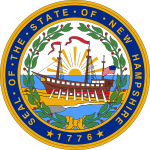
The 13th United States Congress was a meeting of the legislative branch of the United States federal government, consisting of the United States Senate and the United States House of Representatives. It met in Washington, D.C. from March 4, 1813, to March 4, 1815, during the fifth and sixth years of James Madison's presidency. The apportionment of seats in the House of Representatives was based on the Third Census of the United States in 1810. Both chambers had a Democratic-Republican majority. The first two sessions were held at the Capitol building while the third, convened after the Burning of Washington, took place in the First Patent Building.
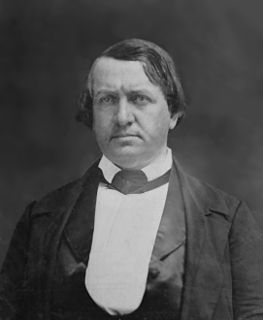
John Parker Hale was an American politician and lawyer from New Hampshire. He served in the United States House of Representatives from 1843 to 1845 and in the United States Senate from 1847 to 1853 and again from 1855 to 1865. He began his Congressional career as a Democrat, but helped establish the anti-slavery Free Soil Party and eventually joined the Republican Party.

John Taylor Gilman was a farmer, shipbuilder and statesman from Exeter, New Hampshire. He represented New Hampshire in the Continental Congress in 1782–1783 and was Governor of New Hampshire for 14 years, from 1794 to 1805, and from 1813 to 1816.

The New Hampshire House of Representatives is the lower house in the New Hampshire General Court, the bicameral legislature of the state of New Hampshire. The House of Representatives consists of 400 members coming from 204 legislative districts across the state, created from divisions of the state's counties. On average, each legislator represents about 3,300 residents.
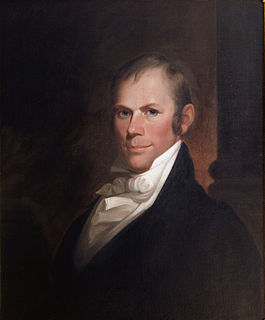
Elections to the United States House of Representatives for the 14th Congress were held at various dates in different states between April 1814 and August 1815 during President James Madison's second term.
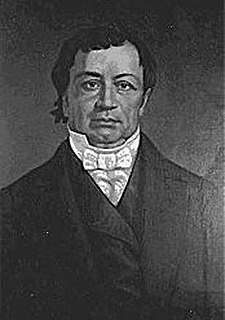
William Badger was an American manufacturer and mill owner from Gilmanton, New Hampshire. He served in both houses of the New Hampshire state legislature and was elected Governor of New Hampshire for two terms.
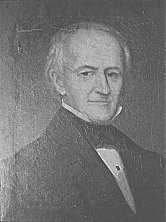
Henry Hubbard was a member of the United States House of Representatives from 1829 to 1835, a Senator from New Hampshire during 1835 to 1841, and the Governor of New Hampshire from 1842 to 1844.
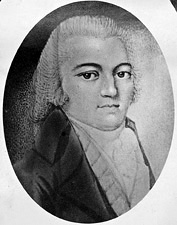
John Fabyan Parrott was a United States Representative and a Senator from New Hampshire.
Samuel Taggart was a Presbyterian Minister, an American politician and a U. S. Representative from Massachusetts.

New Hampshire's 2nd congressional district covers the western, northern, and some southern parts of New Hampshire. It includes the state's second-largest city, Nashua, as well as the state capital, Concord.
Josiah Butler was an American politician and a United States Representative from New Hampshire.

William Merchant Richardson was a member of the U.S. House of Representatives from Massachusetts and chief justice of the New Hampshire Supreme Court.
Francis White was a distinguished early American lawyer and politician in what was then the U.S. state of Virginia.

Elections in the U.S. state of New Hampshire are held at national, state and local level. The state holds the first presidential primary in the national cycle. Elections for a range of state positions coincide with biennial elections for the House of Representatives.

Matthew Harvey was a United States Representative from New Hampshire, the 13th Governor of New Hampshire and a United States District Judge of the United States District Court for the District of Massachusetts.
The United States Senate elections of 1814 and 1815 were elections that had the Democratic-Republican Party lose a seat but still retain an overwhelming majority in the United States Senate. Unlike in recent elections, the minority Federalists had gone into the elections with a chance of regaining their long-lost majority had they swept almost all the seats. However, only one seat switched parties. Two seats held by Democratic-Republicans were left unfilled until long after the next Congress began.
A special election was held in New Hampshire's at-large congressional district on August 25, 1800 to fill a vacancy left by William Gordon (F) resigning to accept an appointment as New Hampshire Attorney General on June 12, 1800.

New Hampshire state elections in 2018 were held on Tuesday, November 6, 2018, with the primary elections being held on June 5, 2018. Voters elected 2 members to the United States House of Representatives, the Governor of New Hampshire, all five members to the Executive Council, all 24 members to the New Hampshire Senate, and all 400 members to the New Hampshire House of Representatives, among other local elected offices.

New Hampshire state elections in 2016 were held on Tuesday, November 8, 2016. Voters elected 4 electors in the electoral college for President of the United States, one Senator in the United States Senate, 2 members to the United States House of Representatives, the Governor of New Hampshire, all five members to the Executive Council, all 24 members to the New Hampshire Senate, and all 400 members to the New Hampshire House of Representatives, among other local elected offices. The Democratic and Republican presidential primary were held on February 9, 2016 and the primary elections for all others offices were held on September 13, 2016.
